
Estezet (STZ) was the code name of a Polish intelligence service branch established in New York City in August 1941 when a cooperative agreement was signed between Polish and American spy services. [1]

Estezet (STZ) was the code name of a Polish intelligence service branch established in New York City in August 1941 when a cooperative agreement was signed between Polish and American spy services. [1]
The branch was set up by Section II (Oddział II) of the General Staff of the Polish Armed Forces. The agency worked in secret at the General Consulate of the Second Polish Republic in New York. Its operational area was the United States, Canada, Brazil, Argentina, Chile, Paraguay, Uruguay, Peru, and Bolivia. The goals of the agency were to observe the military, political situations and the development of the Polish diaspora in countries in the Americas. The agency paid particular attention to agitation and penetration by Communism and its agents with special regard to the United States, Canada and Polish affairs. It also concerned itself with the state, development and political situation of Ukrainian communities and the analysis of Central and Eastern European immigrant press (Polish, German, Ukrainian, Czech, Slovak, Lithuanian, and Jewish).
A digitized collection of Estezet documents is available at the Józef Piłsudski Institute of America. It was given to the Institute by Marian Chodacki, a former Estezet operative, after he entrusted it in the care of at the Sisters of the Holy Family of Nazareth in Phildadelphia in the event of his death. [2]

The Second Polish Republic, at the time officially known as the Republic of Poland, was a country in Central and Eastern Europe that existed between 1918 and 1939. The state was established in 1918, in the aftermath of World War I. The Second Republic ceased to exist in 1939, when Poland was invaded by Nazi Germany, the Soviet Union and the Slovak Republic, marking the beginning of the European theatre of World War II.

Józef Klemens Piłsudski was a Polish statesman who served as the Chief of State (1918–1922) and First Marshal of Poland. He was considered the de facto leader (1926–35) of the Second Polish Republic as the Minister of Military Affairs. After World War I, he held great power in Polish politics and was a distinguished figure on the international scene. He is viewed as a father of the Second Polish Republic re-established in 1918, 123 years after the final Partition of Poland by Austria, Prussia and Russia in 1795.

The history of interwar Poland comprises the period from the revival of the independent Polish state in 1918, until the Invasion of Poland from the West by Nazi Germany in 1939 at the onset of World War II, followed by the Soviet Union from the East two weeks later. The two decades of Poland's sovereignty between the world wars are known as the Interbellum.

The Polish–Soviet War was fought primarily between the Second Polish Republic and the Russian Soviet Federative Socialist Republic in the aftermath of World War I, on territories formerly held by the Russian Empire and the Austro-Hungarian Empire.
Sanation was a Polish political movement that was created in the interwar period, prior to Józef Piłsudski's May 1926 Coup d'État, and came to power in the wake of that coup. In 1928 its political activists would go on to form the Nonpartisan Bloc for Cooperation with the Government (BBWR).
An inspector general is an investigative official in a civil or military organization. The plural of the term is "inspectors general".

Intermarium was a post-World War I geopolitical plan conceived by Józef Piłsudski to unite former Polish–Lithuanian Commonwealth lands within a single polity. The plan went through several iterations, some of which anticipated the inclusion as well of other, neighboring states. The proposed multinational polity would have incorporated territories lying between the Baltic, Black and Adriatic Seas, hence the name Intermarium.

The 1920 Kiev Offensive, considered to be the campaign that started the Polish–Soviet War proper, was an attempt by the armed forces of the recently established Second Polish Republic led by Józef Piłsudski, in alliance with Ukrainian exiled leader Symon Petliura, to seize the territories of modern-day Ukraine which fell under Soviet control after the October Revolution as the Ukrainian Soviet Socialist Republic. The operation led to a Soviet counter-offensive, in the wake of which the short-lived Galician Soviet Socialist Republic was created. The Polish-Soviet War ended with the Peace of Riga of 1921, which settled the border between Poland and the Ukrainian Soviet Republic.
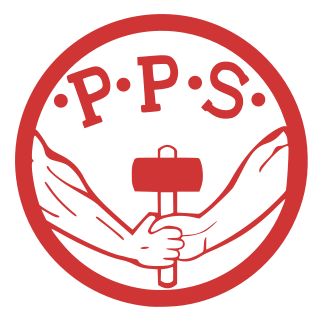
The Polish Socialist Party, a Polish left-wing political party, was one of the most important parties in Poland from its inception in 1892 until its dissolution in 1948. A party with the same name, established in 1987, has remained at the margins of Polish politics.
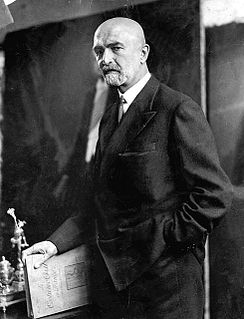
Walery Jan Sławek was a Polish politician, freemason, military officer and activist, who in the early 1930s served three times as Prime Minister of Poland. He was one of the closest aides of Polish leader, Józef Piłsudski.
Józef Kasparek (1915–2002) was a Polish lawyer, historian, and political scientist.
Prometheism or Prometheanism was a political project initiated by Józef Piłsudski, statesman of the Second Polish Republic from 1918 to 1935. Its aim was to weaken the Russian Empire and its successor states, including the Soviet Union, by supporting nationalist independence movements among the major non-Russian peoples that lived within the borders of Russia and the Soviet Union.
This article covers the history of Polish Intelligence services dating back to the Polish–Lithuanian Commonwealth.

General Wacław Jędrzejewicz was a Polish Army officer, diplomat, politician and historian, and subsequently an American college professor.
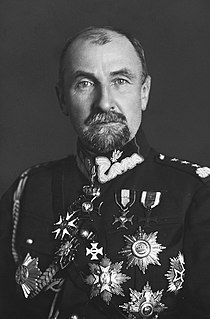
Count Tadeusz Jordan-Rozwadowski was a Polish military commander, diplomat, and politician, a general of the Austro-Hungarian Army and then the Polish Army.
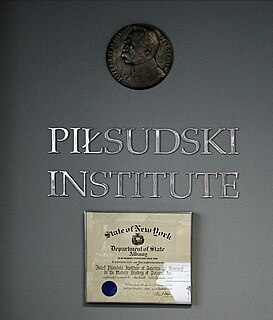
The Józef Piłsudski Institute of America was created in New York City in July 1943. It is an archive, museum and research center devoted to the study of modern Polish history and named after the Polish interwar statesman Józef Piłsudski.
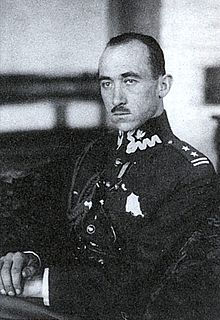
Tadeusz Schaetzel de Merxhausen (1891–1971) was a Polish Army colonel, intelligence officer, Promethean leader, diplomat and politician.
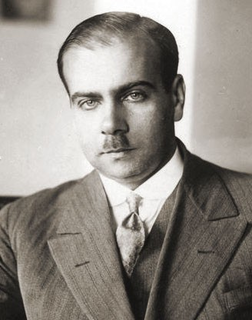
Ignacy Hugo Stanisław Matuszewski was a Polish politician, publicist, diplomat, Minister of Finance of the Second Polish Republic, colonel, infantry officer and intelligence agent of the Polish Army, member of the International Olympic Committee. A strong supporter of Józef Piłsudski, he was counted among the "Colonels" and co-founded the Józef Piłsudski Institute of America.

Marian Stanisław Chodacki – certified colonel of the infantry branch of the Polish Army under the Second Republic, diplomat, the last Commissioner General of the Republic of Poland in the Free City of Gdańsk in the years 1936-1939, executive director of the Józef Piłsudski Institute of America in the years 1949-1951.
National Committee of Americans of Polish Extraction, also known as the National Committee of Americans of Polish Descent or its Polish abbreviation KNAPP, was a Polish-American organization active in the years 1942-1959 in the United States.